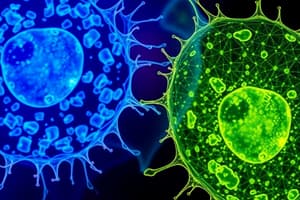Podcast
Questions and Answers
How would a biologist classify the plant stem shown?
How would a biologist classify the plant stem shown?
Dicot stem
In ferns, the plant structure that produces sperm and egg cells is known as which of the following?
In ferns, the plant structure that produces sperm and egg cells is known as which of the following?
- Rhizome
- Sporophyte
- Gametophyte (correct)
- Strobilus
This order of events best describes which type of circulation system in fish?
This order of events best describes which type of circulation system in fish?
Single loop
The diagram shows the steps involved in which type of digestion?
The diagram shows the steps involved in which type of digestion?
Root vegetables, such as carrots, are classified as what type of root system?
Root vegetables, such as carrots, are classified as what type of root system?
Based on certain characteristics, which phylum would a bilaterally symmetric unsegmented organism with a large shell likely be classified into?
Based on certain characteristics, which phylum would a bilaterally symmetric unsegmented organism with a large shell likely be classified into?
The evolution of lungs and gills in distantly related organisms is an example of what type of evolution?
The evolution of lungs and gills in distantly related organisms is an example of what type of evolution?
Which option accurately describes the correct order of events in the process of transpiration within a plant?
Which option accurately describes the correct order of events in the process of transpiration within a plant?
Which phenomenon occurs when we observe plants that wilt?
Which phenomenon occurs when we observe plants that wilt?
Plants that we recognize today spend the majority of their life in which phase?
Plants that we recognize today spend the majority of their life in which phase?
Which process does the plant need energy to perform?
Which process does the plant need energy to perform?
Which set of characteristics accurately describes the phylum Cnidaria?
Which set of characteristics accurately describes the phylum Cnidaria?
The first known bird fossils date to which era of time?
The first known bird fossils date to which era of time?
Ribs serve similar functions in humans, apes, cats, and dogs. These ribs are most likely examples of what type of structure?
Ribs serve similar functions in humans, apes, cats, and dogs. These ribs are most likely examples of what type of structure?
Why are liverworts and mosses still restricted to moist environments?
Why are liverworts and mosses still restricted to moist environments?
Which of the following describes the properties of ferns?
Which of the following describes the properties of ferns?
What best describes why trees change color to red, orange, or yellow in the autumn?
What best describes why trees change color to red, orange, or yellow in the autumn?
Which term describes the skeletons formed by fluid-filled compartments in some jellyfish?
Which term describes the skeletons formed by fluid-filled compartments in some jellyfish?
What key process provides the molecules necessary for cellular respiration and efficient ATP synthesis in animals?
What key process provides the molecules necessary for cellular respiration and efficient ATP synthesis in animals?
Which mechanisms do gymnosperms, such as pine trees, rely on to disperse fertilized seed cones?
Which mechanisms do gymnosperms, such as pine trees, rely on to disperse fertilized seed cones?
Study Notes
Plant Systems
- Dicot Stem: A plant stem classified as dicot showcases specific growth patterns and vascular arrangements.
- Gametophyte: In ferns, the reproductive structure producing sperm and egg cells is called the gametophyte.
- Transpiration Process: Water absorption begins at the roots, moves through the stem, and finally evaporates from the leaves.
- Root Systems: Root vegetables like carrots have a taproot system, known for their deep primary root.
Animal Systems
- Single Loop Circulation: Fish possess a single loop circulation system where oxygen is absorbed through gills and delivered directly to the body.
- Intracellular Digestion: The procedure of digesting food at a cellular level is called intracellular digestion.
- Homologous Structures: The ribcage of humans and various mammals illustrates homologous structures, providing breathing support and protection to vital organs.
- Gas Exchange: Critical for cellular respiration, adaptations like trachea and gills facilitate efficient gas exchange in animals.
Evolution and Adaptations
- Convergent Evolution: The independent evolution of similar traits in different organisms, like lungs and gills, illustrates convergent evolution.
- Radial Symmetry in Cnidaria: Members of the phylum Cnidaria, such as jellyfish, possess radial symmetry, only two germ layers, and a singular digestive opening.
- Hydrostatic Skeletons: Fluid-filled compartments in certain jellyfish provide structural support via hydrostatic skeletons.
Plant Life Cycles and Characteristics
- Diploid Phase: Modern plants predominantly exist in the diploid phase of their life cycle.
- Ferns: These vascular plants utilize xylem and phloem for nutrient transport and reproduce via spores.
- Autumn Color Change: Trees show vibrant autumn colors as chlorophyll degrades, revealing other pigments.
- Seed Dispersal Mechanisms: Gymnosperms, like pine trees, rely on animals, wind, and seed wings to disperse their seeds effectively.
Additional Concepts
- Moist Environments for Ancient Plants: Liverworts and mosses need to grow in moist areas due to their gametes requiring water for movement during fertilization.
- Animal Adaptations: Various anatomical adaptations in animals ensure effective gas exchange for respiration.
Studying That Suits You
Use AI to generate personalized quizzes and flashcards to suit your learning preferences.
Description
Test your knowledge on plant and animal systems and behaviors with these flashcards from Penn Foster's Biology Lesson 5. Discover essential concepts like dicot stems and gametophyte structures in ferns. Perfect for exam preparation and quick reviews!




